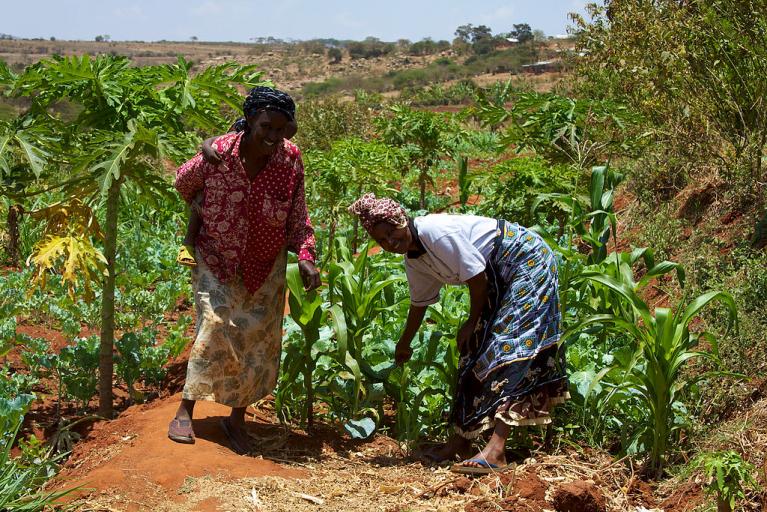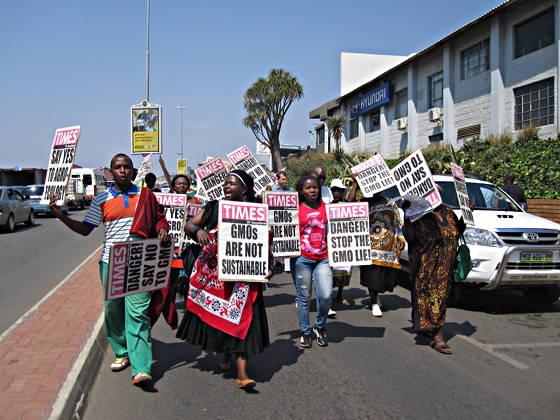Latest Resources

1 November 2018
Demystifying GM maize through collective action on World Food Day
In an effort to highlight the complex and concentrated South African agricultural and food system, with its unsustainable and deepening inequality, the African Centre for Biodiversity (ACB) and partner organisations initiated a “no GMO-maize campaign” earlier in 2018. This was followed up in August 2018, with a meeting of organisations that included Zingisa, Ntinga Ntaba […]

30 October 2018
Reflections on ITPGRFA, UPOV 1991 and South Africa
Recently the Department of Agriculture, Forestry and Fisheries (DAFF) held national consultations on whether South Africa should accede to two international agreements related to seed: The International Treaty on Plant Genetic Resources for Food and Agriculture (ITPGRFA, or the Treaty) and the International Convention on the Protection of New Varieties of Plants (UPOV) 1991. The […]

14 June 2018
Restrict, regulate and reduce corporate power in South Africa’s food system
I attended a dialogue on corporate ownership in South Africa in May, in Tshwane, hosted by Trade and Industrial Policy Strategies (TIPS). There was strong government representation at the dialogue, including from Treasury; Trade and Industry; Minerals and Energy; and Planning, Monitoring and Evaluation. Someone from the EU was also there. Corporate concentration is a […]

6 June 2018
Bayer opposes black economic empowerment in purchase of Monsanto
The Competition Tribunal announced the finalisation of the merger between Bayer and Monsanto in South Africa in May. Bayer had taken the original conditions imposed by the Competition Commission in 2017 to the Tribunal for reassessment. These included selling businesses to black economic empowerment (BEE) compliant companies. Bayer has claimed confidentiality on the conditions, making […]

4 June 2018
The debate on GMOs in Africa rages on, this time in Tanzania
A heated public debate on genetically modified organisms (GMOs) ensued during a seminar organised by MVIWATA – a network of smallholder farmers – in Morogoro, Tanzania. The meeting took place on 12 May 2018 and was attended by more than a hundred people, including parliamentarians and high-level government officials. The event, which was intended only […]

28 May 2018
Biosafety Indaba eSwatini: Unclear motives following approval to cultivate Bt cotton, despite dis...
The news that the Swaziland Environmental Authority (SEA) had authorised the importation and commercial release of Bt cotton seeds came as a huge shock to the African Centre for Biodiversity (ACB). It meant that ACB had to reconsider its earlier acceptance of an invitation by SEA to attend a National Biosafety Indaba on 22 May […]

15 December 2017
Harmonised corporate seed laws in Africa: Where does this leave smallholder farmers?
The expansion of the corporate seed market, embedded in the green revolution agenda in sub-Saharan Africa is progressing very fast. This expansion is going hand in hand with regional policies and regulations – in a process also known as seed harmonisation – that will enable facilitate trade across national borders. This has been the case […]

18 October 2017
The GMO crisis in Swaziland
Swaziland is under enormous pressure to introduce genetically modified organisms (GMOs) into the country’s farming system. This pressure is coming not only from Monsanto but also from farmers and some sections of the public who have been fed a great deal of misinformation and hype by the pro-biotech machinery. The farmers, acting on incomplete and […]

19 September 2017
Erosion of farmers’ seed and agricultural systems in Tanzania
There are no simple answers when it comes to predicting the future of African food systems. Across the continent, the push to commercialise African agriculture to feed the growing and urbanising population, increase incomes, and reduce poverty is well known. However, this ‘solution’ is also heavily criticised for its ineffective, inappropriate and misdirected approach for […]

31 July 2017
The Water Efficient Maize for Africa (WEMA) project: Real or false solution to climate change?
By Lim Li Ching, Senior Researcher, Third World Network Climate change is an urgent challenge facing farmers in Africa. As our world warms, many farmers are already experiencing devastating consequences, including storms, drought, floods, heat waves and extreme weather events. The implications for food security are severe, with the Intergovernmental Panel on Climate Change (IPCC) […]
